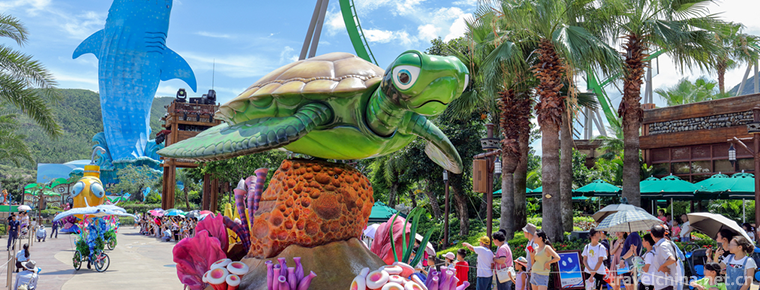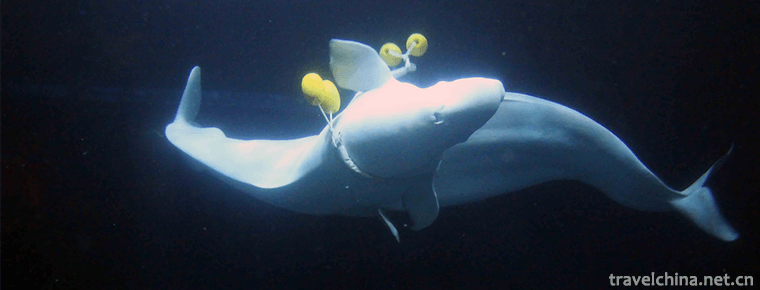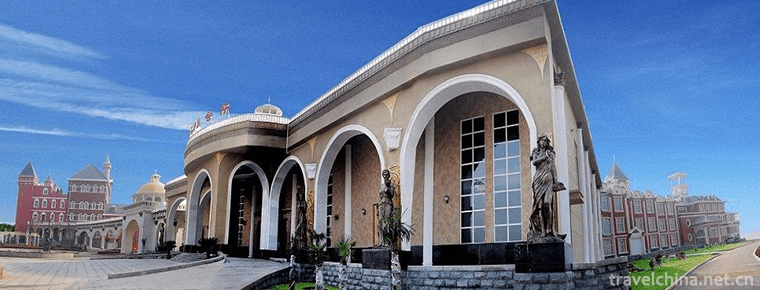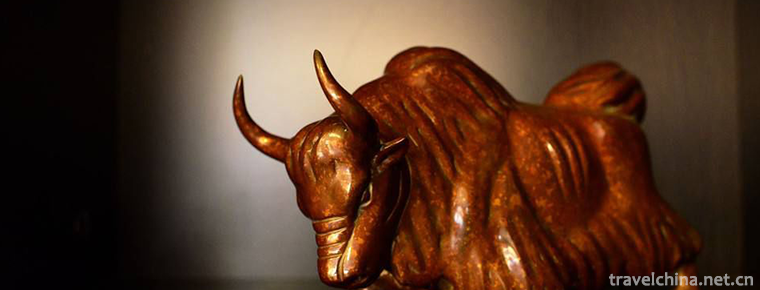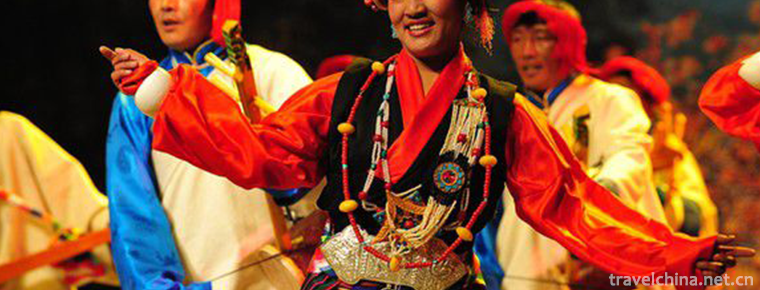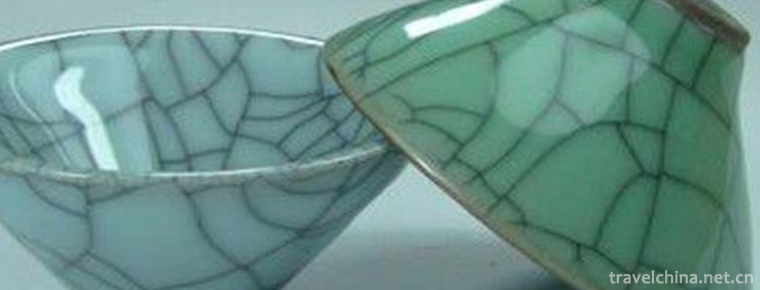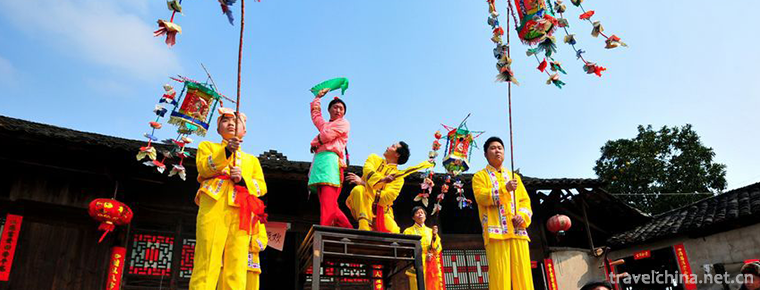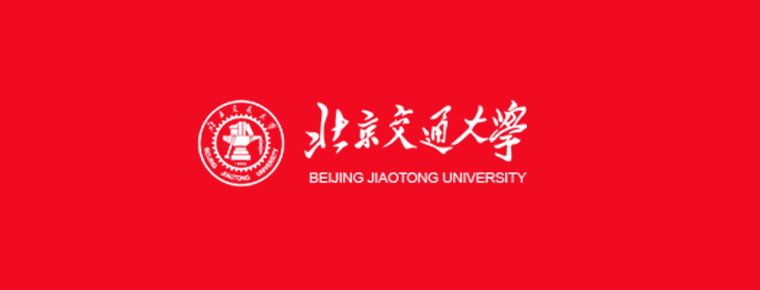Japa Ma and Jami Ma
Japa Ma and Jami Ma are the local traditional folk literature in Lianghe County, Yunnan Province, and one of the national intangible cultural heritage.
Japa Ma and Jami Ma tell the story of the ancestors of the Achang nationality, Japa Ma and Jami Ma, who made heaven and earth, created human beings, made up heaven and water, fought evil spirits and wax horses, and spent the whole day on earth. The epic plot is vivid and moving, the character is distinct, and the language is simple and fresh.
On May 20, 2006, Jasmine and Jasmine were listed in the first batch of national intangible cultural heritage list with the approval of the State Council.
historical origin
"Japa Ma and Jami Ma" originated in the early stage of the Achang nationality. It is a kind of folk literature produced by the ancestors of the Achang nationality in order to thank Japa Ma and Jami Ma for their creation, to mend the heaven and sew the earth, to descend demons and demons, and so on.
Cultural characteristics
Content architecture
The earliest "Japa Ma and Jami Ma" myth mainly tells the story of human origin, that is, the myth of the ancestors of the Achang people, as the gods of the ancestors, tells in a more casual way, either by the ridge of the field, by the fire pond, or on the bed of the dead at night. Usually, it is the old man who tells the children about the history of the clan, introduces the achievements and hardships of the ancestors. In the first place, the old man tells the story of the clan. In some special days, the noble old people in the tribe will also tell people the myth of Japa Ma and Japa Ma, educate young people about the struggle history of the Achang clan, and make future generations always remember the achievements and history of their ancestors.
artistic characteristics
Among the ancestor worship of the Achang nationality, the highest and most influential creator gods of the Achang nationality are Japama and Jamima. Among the cultures and beliefs of the Achang people, Japa and Jamai enjoy a high reputation and are honored as "Heaven Gong" and "Earth Mother". In Achang, the word "cover" refers to "soldiers fighting", "parma" and "mima" are respectful terms for older men and women respectively. The word "japama" refers to the head of the army and the commander-in-chief. The word "jamai" refers to the wife of the commander-in-chief.
The legend of Japa and Japa originated from the Creation Epic "japa and jamai" written by the Achang people. "Japa Ma and Jami Ma" is a poem sung by the living robes (priests) of the Achang nationality during the sacrificial activities. The epic tells us that Jasmine and Jasmine defeated the devil in the process of making heaven and earth, and created a better world for human beings. Legend has it that in ancient times, there was no heaven and no earth. It was the Heavenly Gong who created the heaven by "Japa Ma", and the Earth Mother who weaved the earth by "Jami Ma", so that human beings gradually multiplied and began to live and work in peace and contentment. However, the God of drought, Lama, made a false sun and nailed it to the sky, destroying human happiness. Japa and Japa are for the survival of all things in the world. The demons were demonized, the Lamas were subdued, and the false sun was shot down with arrows, so that human beings could be reborn. From then on, they became the defenders of peace and happiness and the Evictors of evil in the eyes of the Achang people. Japama and Japama are the supreme gods of the Achang people. Their images become the embodiment of the spirit of perseverance and struggle of the Achang people. They are the embodiment of good wishes and great power to overcome evil and change the world.
Because of the lofty status of Japa and jamai in the history of Achang, after the 1980s, when the "Wolo Festival" was confirmed as the grand festival of the Achang people, Japa and jamai became the main gods of sacrifice and commemoration. People painted Japa and jamai portraits for worship. A Memorial officer was built in the Wolo Square of Jiubao Township, Lianghe County. Officials specially sculpted Japa and jamai. Statues, for people to pay homage. In Festival celebrations, the living gown recites the epic "Jasmine and Jasmine" (excerpts), a ritual that has continued.
The legends of Jasmine and Jasmine are basically the same in content, whether they are poems or vernacular stories. The story tells the story of the Achang people's ancestors, Japama and Jamima, who made heaven and earth, subdued floods and wastes, created human beings, and wisely fought against evil spirits to restore peace in the universe.
Japa Ma and Jami Ma are not only the most worshipped gods of the Achang people, but also the gods of the protection of all ordinary people and the gods of the sacrificial activities of the Achang people.
Jasmine and Jasmine is a long poem about creation. It also vividly reflects the transition from maternity to patriarchy. The myth of Yanpo in the story is a "living fossil" of the nomadic culture of the ancient Southwest ethnic groups.
Inheritance mode
There are two forms of "Japa Ma" and "Jami Ma" circulated among the folk of the Achang nationality. One is the mythological story in prose style, the other is the epic. Two different genres of Jasmine and Jasmine have different ways of inheritance.
I. Talking from the Edge to the Fire Pond
Nowadays, Jasmine and Jasmine are basically the same in both prose and poetry. However, the original "Jasmine and Jasmine" is not so. The content of Jasmine and Jasmine originally spread among the people in the form of mythological stories. The plot is simple, and maybe even several myths are not related to each other. Later, in the process of spreading, the ancients of Achang continued to reprocess art, and the content became increasingly rich and vivid. The original unrelated plots were linked together to form a whole. Finally, with the development of the primitive religion of the Achang ethnic group, there appeared the poetry style "Japa Ma" and "Jami Ma" singing in religious occasions. The emergence of the epic of Jasmine and Jasmine is reprocessed on the basis of the original myth, which adds different contents in different times and integrates many social life and life experience summaries. This makes Jasmine and Jasmine more systematic.
Even now, the narrative of the prose style "Japa Ma and Jami Ma" is still very casual, beside the ridge, the little pond and the quiet bed at night, especially for men, women and children.
II. The Inheritance between
the Live Robes
The way of inheritance of the epic of Japa Ma and Jami Ma is totally different from that of the prose style of Japa Ma and Jami Ma. The epic of Japa Ma and Jami Ma can only be recited by the living robes of the Achang nationality in specific religious rituals and folk activities.
The "living robe" of the Achang ethnic group, that is, the person who recites sutras, is translated into Chinese as the "sutra teacher". Living gowns are mostly knowledgeable, experienced, knowledgeable in medicine, and can cure diseases. In the daily life of the Alu people, the living gown has a lofty social status. All the religious activities of the Achang ethnic group are attended by live robes, and even funerals are mostly presided over by live robes. Every activity in which a living robe participates or inhabits must be recited by a living robe, mainly the epic "Japa Ma and Jami Ma". In the living robe, the epic Jasmine and Jasmine is a religious text. Therefore, the epic Jasmine and Jasmine can only be recited by living robes in religious ceremonies, which determines that the inheritance of the epic Jasmine and Jasmine can only be carried out between living robe masters and apprentices.
3. Inheritance of Folk Festival Activities
The folk customs and festival activities of the Achang nationality also played an important role in the inheritance of Japa Ma and Jami Ma.
Aluwoluo Festival is the largest national festival of the Achang nationality, and also the largest folk activity of the Achang nationality. It is also the most closely related festival to the inheritance of Japa Ma and Jami Ma.
The Aluwoluo Festival is a combination of the traditional festivals of the Achang nationality, the "Woluo Festival" and the "Aluwolu Festival" (also known as "Catching-up Street"). Aru Festival is a traditional festival of the Achang people who believe in Hinayana Buddhism. "Wo Luo" is also known as "Tie Wo Luo". It is a traditional dance in which the Achang people sing praises to their ancestors, Japama and Jamima, which created human beings and multiplied their descendants. In May 1993, at the 30th meeting of the Standing Committee of the Ninth National People's Congress of Dehong Prefecture, Yunnan Province, it was decided to merge the Festival of Wolo with the Festival of Alu. The name of the festival was unified as the Festival of Alu Wolo, which was held on March 20 every year for two days.
The Water-Splashing Festival of the Achang nationality also has an important influence on the inheritance of Japa Ma and Jami Ma. The Achang Sprinkling Festival, also known as the Sangjian Festival, originated from the myth of "Japa Ma and Shadow Ma". It is said that Achang boy Laliang fights with three-mouthed monsters. When he is exhausted, Shami Ma sends messengers to give him a gourd holy water and a branch of Sangjian tree. La Liang sprinkled it with mulberry branches and holy water. The dead flowers and trees revived and the three-mouth monsters were killed with mulberry sticks. The Water-Splashing Festival of the Achang nationality is held every year on the seventh day after the Qingming dynasty. It lasts four days. During the festival, young men and women go to the mountains to collect flowers, tie flower towers and sedan chairs with flowers, place them on the square, then water the flower towers and sedan chairs with clear water to bathe the Buddha statues in the sedan chairs. Finally, people sprinkle water on each other to bless each other and eliminate disasters, while young people seek partners in the Water-Splashing scarf festival. As the Water Sprinkling Festival originated from Jasmine and Jasmine, the activities of the Water Sprinkling Festival played an important role in expanding the influence of Jasmine and Jasmine.
In addition, when the Achang nationality builds houses, marries new people, funerals, and receives guests, they should also sing and dance. When singing, you must first make a family tree. The so-called Panjia genealogy is to sing about the history of our nation, narrating the achievements of our ancestors, Japa Ma and Jaimi Ma, in defeating the devil Rama, creating human beings and multiplying their descendants. In fact, Tie Wo Luo is an ancient religious ceremony to sacrifice Jasmine and Jasmine, which plays an important role in the inheritance of Jasmine and Jasmine.
Forms of expression
The long poem creation myth of the Achang people, Japama and Jamima, is mainly spread among the people of the Jingpo Autonomous Prefecture and Lianghe County of the Dai nationality in Dehong, Yunnan Province. It is still popular today in the form of singing poems and oral vernacular.
In addition, the population of the Achang ethnic group totals more than 30,000 people, most of whom live in three Achang ethnic townships of Lianghe County, Dehong Prefecture, Yunnan Province, Jiubao, Song Dynasty and Husa County, Longchuan County. In the religious and folk activities of the Achang nationality, we must recite all the "Japa Ma and Japa Ma". When ordinary people build houses, greet relatives and marry matchmakers, they sing and dance at the same time. The first lyrics are Pan genealogy. First, they sing the praises of the ancestors of the Achang people, Japama and Jami Ma, who created human beings, so that the questions of the people can be married and continue to multiply and inherit.
Ceremonial activities
The ritual activities of the Ah-Chang Ah-Lu-Wo-Luo Festival include the ceremonies of the Ah-Lu Festival and the Ah-Lu Festival, the main activities of the festival and the taboos of the statute. The most important ceremony of the Achang Waluo Festival is to sacrifice the Heavenly Gong, Japama and Gemi Ma. Liqiu is the main sacrificial ceremony of the Achang people during the Spring Festival in the first lunar month in the past. The Alu Festival of the Achang people in Longchuan is similar to the Dai people's "going into and going out of the depression". Therefore, the most important ritual during the Alu Festival is the sacrificial ceremony of "going out of the depression" of the Buddhism in the upper seat of Nanchuan, and the sacrificial color mang is the Achang people Traditional sacrificial rites. The main activities of Aaru Festival are to rush to the streets. The main activities of Aaru Festival are to pedal Aaru. The statutes and taboos of Aaru Festival and Aaru Festival are different and unique.
Sacrifice to Heavenly Prince and Earth Mother
The Japa and jamima in the long Genesis epic recited in the traditional sacrificial activities are praised as "the God of heaven" and "the mother of the earth" by the people of the Achang nationality, and have a lofty position in the whole Achang culture. Since the Aluwoluo Festival became the unified festival of the Achang people, during the festival period of the Achang people in Lianghe County, Shapama and Shamima have become the main gods of sacrifice and commemoration. People make statues of Shapama and Shamima to worship and hold sacrificial activities. In celebrating the festival celebrations or major events of the Aluvolo Festival, we should invite living gowns to recite the epic "Japa Ma and Jami Ma". Its meaning is to praise their great achievements to mankind, and hope to receive their blessings and blessings to ensure the safe and smooth activities, but also to make the Aluvolo Festival have a longer historical connotation. After the commencement of the festival celebrations, the robes were dressed in traditional sacrificial costumes, blue robes, belts, black or red bald heads, a pheasant tail feather in one hand, and a large black fan in the other hand. They were solemnly and solemnly displayed in the venue (stage).
In the middle of the venue (Woluo Square in Jiubao Township of Lianghe River specially constructed a memorial official to offer sacrifices to Jasmine and Jasmine), a sacrificial platform was set up, and a wooden carving horse, an ancestral sacrificial vessel of a living robe, was placed on the platform. It is said that the Trojan Horse attaches to the gods of ancestors, mainly for evil, praying for peace in the festival. In front of the Trojan horse, place the incense stove and burn incense. The sacrifices include grain, clear water, wine, tea, pig head, cooked chicken, knife, etc. Meat and whole chicken represent the next year's plentiful food and clothing; rice and eggs represent the next year's plentiful grain; water represents the next year's fertilizer and fertilizer; knives and scissors are used to exorcise evil spirits. Caragana feathers are used to recite the number of corresponding sections in Japa Ma and Japa Ma.
The blood spot of cock's crown in the archway is called "Dinghong". The live gown recites the congratulations in Achang language, which roughly means: "Today is a good day. Japa hemp and Jami hemp protect us in the sky. Our days are clean, peaceful and safe, bringing convenience to production and life." Then he chanted the Genesis Epic "Jasmine and Jasmine" loudly in Achang Ancient Language. It is not necessary to recite all the chapters of Japa Ma and Japa Ma. It is necessary to begin with the creation of heaven and earth, the creation of nine barbarians and the subjugation of Rama, etc. until the world is quiet.
Inheritance and protection
Inheritance significance
As a long poem describing the creation in detail, Japama and Jami vividly reflects the transition of human society from maternity to patriarchy. The myth of Yan Po described in the story is a "living fossil" of the nomadic culture of the Southwest ethnic group in ancient China. "Japa Ma and Jami Ma" is also regarded as a monument to the cultural development of the Achang people. At the same time, the Achang people also call it "the song of our nation".
Inheriting characters
Cao Mingkuan, male, was born in October 1943. In June 2007, Cao Mingkuan was selected as the representative successor of the first batch of national intangible cultural heritage projects and declared in Lianghe County, Yunnan Province. Project Name: Jasmine and Jasmine.
protective measures
Since 1979, the collation of the folk literature of the Achang ethnic group has begun. In January 1983, Yunnan People's Publishing House officially published a single edition of Jasmine and Jasmine (the whole poem is 40,000 words, 1080 lines).
social influence
Important activities
On the evening of March 19, 2018, the Dance Drama "Japa Ma and Jami Ma" by Dehong Xing, a Chinese tea merchant, was performed at the Achang Cultural Square in Lianghe County.
Honorary commendation
In 2013, Yunnan National Culture Audio-visual Publishing House filmed, produced and published "Yunnan National Singing Art - The Creation Myth Epic of the Achang Nationality of Eleven Oral Singing Arts of Nine Nationalities in Yunnan Province <Japama and Jamima> which reflects the true nature of minority literature, promotes the excellent oral and folk culture and singing art of Yunnan Province, and won the third China Publishing Administration. Government award.
Cultural anecdotes
I. The Legend of Creating Heaven and Weaving Earth
In ancient times, there was no sky, no land, "the whole world is chaotic, neither wind nor rain". I can't remember the year and month when a white light suddenly flashed out in the chaos. With white light, with darkness, there is Yin and Yang. Yin and Yang were born together, Tiangong Shapama and Gemu Shamima were born, and there were also 30 divine generals and 30 divine soldiers.
Japa Ma was naked and stood up slowly against the sky. As he stood up, the sky and the earth gradually separated. The hemp straightened its waist and the sky rose 90,000 li. Japama straightened his back, lifted his hands up and sent the sky up nine hundred and ninety thousand miles.
He waved the whip and called in thirty generals, thirty soldiers and three thousand six hundred white cranes. He let the soldiers carry the silver sand, let God pick up the gold sand, let the crane flare up its wings, set off a gust of tumbling wind. When there is wind, there is rain. He mixes rainwater with gold sand and makes a sun. He mixes rainwater with silver sand and makes a moon.
The sun and moon are made, but there is no place to put them. Japama tore off her left breast and put it on the ground to become a Taiyin Mountain; she tore off her right breast and put it on the ground to become a Sun Mountain, each of which is 180,000 feet high. Since then, the man has lost his breasts. The moon is picked up on the right and the sun is picked up on the left, leaving a rainbow at each step, stepping on the Milky Way where it passes, and the exhaust gas turns into clouds all over the sky, and the sweat turns into rain. Japama puts the moon on the top of the Taiyin Mountains and the sun on the Sun Mountains.
Japama planted a Thoreau tree between Taiyin Mountain and Sun Mountain. The sun and moon revolved around the Thoreau tree. The sun came out during the day and the moon came out at night. He built the East sky with pearls, the South sky with agate, the West sky with jade, and the north sky with jadeite.
Simultaneously with the birth of Jasmine, Jasmine was also born. When she was born, she found that there was no support under her feet. Zhou was narrow and empty. She could not help screaming. She was naked. Her hair and face were eight feet long. She had a throat larger than mango on her neck. She took off her throat as a shuttle, and the woman lost her throat; she pulled out her face and woven the earth, and the woman lost her beard.
Shamima plucked the hair from his right face and woven the land to the east; plucked the hair from his left face and woven the land to the west; plucked the hair from his chin and woven the land to the south; plucked the hair from his forehead and woven the land to the north. The earth was woven, and the blood from Shamima's face turned into an endless sea.
The Heavenly Gong made the heaven by shading the linen, while the Earth Mother made the earth by shading the linen. As a result, the heaven made the earth smaller and the earth woven bigger, and the horizon could not cover the earth. At this time, thunder exploded in the sky, shocked the earth, and danger came. Shamima quickly pulled out three ground lines, resulting in an earthquake, some parts of the earth protruded, some parts concave; protruded areas became mountains, concave areas became plains. Since then, the land has shrunk and the horizon has covered the ground line.
2. Give birth to a gourd seed
After the heaven and earth were built, the God of heaven and earth came to the earth. He looked at the beautiful land and was puzzled. He decided to go to the God of weaving the earth and run around with the whip.
Shamima gathered up three ground wires and looked at the sun, moon and white clouds in the sky. She was also surprised. She decided to go to the God of Heaven. She went up the mountains and down the plains, hungry for wild fruits, and cold for grass.
Finally, on a sunny morning, in the middle of the earth, on a high mountain, Jasmine and Jasmine met. Japama praises Jamai's woven land, with lofty mountains, vast grasslands, fertile valleys, and vast oceans. But Shamima said, "No matter how good the land is, nobody is there!" "Let's combine and create human beings together," Japama said.
They wanted to combine to create human beings, but they were afraid of violating the will of heaven. They decided to choose a hilltop and build a fire, so that the fireworks represent the will of God. At the same time, two thick clouds of smoke rose from two hilltops, and the two thick clouds intersected in the sky, turning into a cloud of smoke. Jasmine and Jasmine are safely combined.
Nine years later, Jasmine gave birth to a gourd seed, and Jasmine buried the gourd seed in the soil. Nine years later, gourd seeds sprouted and a ninety-nine-foot-long gourd vine grew. Such a long gourd vine, but only a flower, a gourd. The longer the gourd is, the bigger the gourd is. Shapa Ma is afraid that it will break the earth. He beat it with a magic whip. Unexpectedly, he made a big hole. "Nine dolls jumped out of the hole". When he saw Shapa Ma, he said, "Kindness and warmth call mother".
The first human beings were born in this way. Nine brothers and sisters exchanged with each other, loved each other, and gave birth to offspring. People grew up gradually.
Jasmine teaches people to hunt and fish, and Jasmine teaches people to make fire and cook. They also taught people how to domesticate birds, animals and knot notes. From then on, human beings lived on the beautiful and rich land.
3. Manufacturing Nantianmen
The good days of mankind have passed year after year. One day, suddenly, the sky thunder and lightning, thunder and lightning cut down trees, the wind opened the curtain of the sky, rainstorms fell to the earth. In a twinkling of an eye, the earth became a vast ocean.
The earth and the sky are broken, and the mother of the earth is rushing to mend it. She sewed up the eastern, western and Northern worlds with the three ground threads she had left behind, only the southern ones, which she sewed wirelessly. There was a strong wind and heavy rain in the south, which turned into a vast ocean.
The southernmost place is called Lachidan. If a south gate is built in Raniedan, it will keep out the wind and rain coming from the south. After discussing with Jasmine, Jasmine decided to build the South Tianmen Gate.
That morning, after saying goodbye to Jaime, Jaime set out to Raniedan in the South with thirty divine generals and thirty divine soldiers. The mountain blockades the road, and the japama uses the whip to drive away the mountain; the river blockades, and the japama uses the whip to build a bridge. I don't know how many days and nights they have traveled, and they have finally arrived at Raniedan.
At this time, the whole Raniedan was soaked in the flood, and the surviving people and animals were trapped on the mountain. The flood is still rising to the top of the mountain.
Leading by the God of War, Japama built a wall of stones to block floods and a South Gate of heaven to block the wind with wood. The flood overcame, the wind and rain blocked, and people and animals returned to the plain and restored their peaceful lives.
When Nantianmen was built, the beautiful God of salt, Sangu, fell in love with Japama. Every day she followed behind Japa Ma, and from time to time she provoked Japa Ma with sweet words.
Having built the South Tianmen Gate and blocked the flood, Shapama is ready to go home and return to the center of the earth. But Sangu, the God of salt, refused to let him go. Finally, Jappa fell in love with Sanguni.
IV. Troubleshooting of the
Drought Monarch
During Japama's journey to the south, strong winds and lightning gave birth to the God of drought.
The wax bow landed in the middle of the earth. The nature of Rama is to create chaos and enjoy destroying human happiness. He saw people working and knitting in the daytime, singing and dancing in the evening, and happy days. He built a false sun and nailed it to the sky. From then on, there was only day on the ground and no night. The sky is like a steamer. The ground is like a red-hot pot. The pond dried up, the grass withered, even the horns of the buffalo were bent by the false sun, and the back of the cattle was scorched by the false sun. Rama drove the mountain animals into the water and the aquatic animals into the mountains, forcing the trees to grow upside down. Fish are rolling on the hill, animals are floating in the water, and the world is in chaos.
Watching the drought devil run rampant, the living creatures smeared with charcoal, listening to the pain of animals and people's call for help, Shami was anxious. She was unable to overcome the drought demon and could only hope for Japama's return day and night. But there was no news of Japama.
The orbital hemp couldn't hear the news of the orbital hemp, so it was in a hurry. She sent her dog to Raniedan to deliver the letter, but the dog thought it was too hard to walk on the high road of Raniedan Mountain to live or die. She called the chicken to Raniedan to deliver the letter, and the chicken could not live or die.
Shamima burst into tears. When will Japama return when the letter can't be delivered?
At this time, a little otter cat appeared in the river. The Little Otter cat was asked to deliver the letter to Raniedan, and the brave otter cat agreed.
What a little otter cat, picking the right way. It goes up faster than a rabbit and down faster than a tiger. When it comes to a thorn, it goes through it as soon as it bows its head; when it comes to a deep ditch, it jumps across it; when it comes to a big river, it plunges in - a fierce man. Little otter cat turned ninety-nine mountains and crossed ninety-nine ditches. The meat ran away nine jin, the skin was worn nine layers, and finally came to Raniedan. It reported the disaster of the central earth to Japama.
Hearing that the central earth had suffered, Japama was so anxious that he immediately called up the divine generals and prepared to return to his hometown. The people of Raniedan knew it, and they all came to keep him.
When Sangu heard that Japama was leaving, she burst into tears. She begged Japama not to leave the south, not to leave her.
Everyone's retention, Sangu's tears, touched Japama. He can't decide whether to go or stay. He decided to go or stay by guessing God's will. He took everyone to hunt and chased mountain mice. If the mountain mice came out of the old hole into the new hole, God wanted him to stay. If the mountain mice came out of the new hole into the old hole, God wanted him to come back. Finally, the mountain mouse ran out of the new hole and got into the old one. Knowing the will of heaven, Shade Ma will leave Raniedan with his soldiers.
Sangu followed Japama and brought her salt to the central earth.
Fifth, demons and Demons
When Japama returned, it saw drought and famine. The false sun pinned to the sky shines on the heat in the air, the ground is steaming hot, the earth is cracked, the mountains and forests are smoking everywhere, and the crops are gone. "Three years after the Lama Rebellion, the earth suffered from famine for four years."
Japama was angry, waving a whip and shaking the mountain. However, he controlled his anger and decided to pretend to be friends with Rama, defeat him by magic, and eliminate him.
Japama went into the house of Rama. Drought drums round twelve eyes. Flames burst out from his nostrils. His face was murderous, and he did not say a word. Zappa smiled and said that he had come to make friends. Rama thought that Japa was afraid of him. He said that he could make friends. He must take him as a big man, and that heaven and earth belong to him. Zappa Ma said that the respect for who is big, through the game magic to decide, who is big magic, who is in charge of the world. La Ma thought that magic was limitless and promised.
Japama and Daphne went into the forest. The dragon came to a peach tree and pinched his finger. At the same time, he said a curse. As soon as the curse was finished, the leaves of the peach tree were all withered. Rama said proudly that no one's magic is as good as mine. I have the power of life and death. Japama says that killing is easier than resurrecting. If you really have the ability, let the dead shoots germinate. He said a curse to the peach tree and sprayed a clear spring. Soon, the dead peach tree stretched out its branches, lifted its leaves and sprouted new buds.
Watching the magic of Jappa Ma, Rama stared and hung his head. Soon, he showed his fierce face again, demanding to win or lose by dreaming and fighting twice more.
For the first time, Rama slept on the top of the hill. Shapama slept at the foot of the hill.
Japama dreamed that the sun he had made rose again from the sea. Trees that had been sunburned by the false sun had come alive. Birds flew back to the woods. Fish were swimming in the water. The world was full of joy.
Rama dreamed that his false sun had set and he was bumping around in the dark until he hit a tree and woke up in fear.
For the first time in his dream, Rama failed.
The second dream of fighting, Shapa Ma sleep on the top of the mountain, wa sleep under the mountain.
This time, Lama dreamed that the sky had collapsed and the ground had collapsed, and he had fallen into the abyss of ten thousand feet. Three fights, three defeats, and finally agreed to make friends with Japama.
Japama invites Rama to dinner. Sangu put salt in the meal. Rama thought it was delicious. The next day, Jappa Ma set up a clever plan, let Rama eat the poisonous bacteria "ghost to worry about", and poisoned Rama to death. "The corpse of La * am's body was strong, and the dog bit his heart. The pig went to arch his liver, 708 scattered and broken into ten thousand pieces.
The wax horse died, and the jappa hemp cut down the chestnut tree and made a hard bow of a kilogram; the Dragon bamboo was cut down and made a sharp arrow of nine feet long. He drew his bow and fired arrows, shooting down the false sun.
The false sun set and the sun and moon made of shampoo appeared in the sky. Real solar energy can come out and fall, the real moon can rise and fall, everything in the world has restored its original order, and peace and happiness have returned to the world.
Shapama wielded the whip, upgraded the fallen trees, turned back the rivers and rectified the chaotic world. He put the mountain animals in the water back on the mountain, and drove the fish trapped in the mountain back into the river.
In order to make human beings live happily, Jasmine teaches men to cultivate their fields, and Jasmine teaches women to spin and weave. Then, Jasmine and Jasmine flew to the sky, Jasmine rode to the moon, and Jasmine rode to the sun. During the day, the orbital hemp overlooks the earth; at night, the orbital hemp patrols the sky and protects human peace.
The Achang people multiply and thrive, and their population is increasing. They live a good life from generation to generation.
6. Overcoming the Three-mouth Monster
The happy days of the Achang people passed year after year, and when they passed on to the 990s, the ghost of the Drought Morax returned to the sun.
Rama hated Japama for breaking his body into pieces, which made him suffer for thousands of years. He was born into a monster with three mouths, one of which was devoted to eating the sky, the other to eating the ground and the other to eating people. Legend has it that he spreads plague everywhere and eats nine boys and girls every day.
People hated the three-mouthed monster of Rama Tuosheng and drove him out of nine mountains. However, the three-mouthed monster refused to fail and used magic to dry up all the water on the earth. Without water, the leaves withered, the fields cracked, the crops caught fire, and people lived in misery.
Sanzui watched people suffer and killed them again. Once again, people took up sticks, knives and forks and fought against the three-billed monster. The trickster's magic was so big that people could not fight him and soon lost the battle. Just then, a young man named La Liang climbed up the tree. He opened his hard bow, fired two arrows in a row, and hit two of the three-mouthed weirdo's eyes. Three-mouthed monsters screamed and ran away. When they left, a black wind swept up and nine boys and girls were captured.
In order to find the boys and girls who were captured by the three-mouthed monsters, La Liang, with a hard bow on his back, climbed over 99 mountains and defeated countless venomous snakes and beasts. When La Liang was exhausted, a messenger from Shami Ma sent to La Liang a gourd holy water and a branch of "Sangjian" full of white flowers. He was told, "Water is holy water, flowers are divine flowers, and mulberry branches are demon sticks. No matter where and whenever Sangjian branches are dipped in holy water and wine, disaster can be eliminated and disaster avoided."
La Liang was very happy to hear that. He dipped mulberry branches in holy water and sprinkled them on the ground. Suddenly, dead plants and trees came back to life, and the plague sown by the three-billed monster disappeared. He took advantage of the victory to pursue, rescued the boy and girl who were captured by the three-mouthed monster, and killed the three-mouthed monster with Sang Jianshu's demon stick. Since then, people have lived a happy and peaceful life.











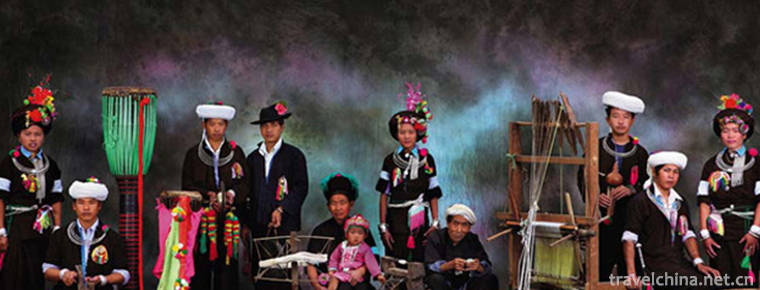
-
Beijing Ocean Hall
Beijing Ocean Hall, located on the North Bank of Changhe River in Beijing Zoo, is adjacent to Beijing Exhibition Hall, Astronomical Museum and Capital Stadium in the south. It covers an area of 120,00.
Views: 112 Time 2018-12-26 -
Hanover Manor
Hannuo Manor is a national AAAA-level tourist attraction, located in the southeast suburbs of Shanting District, Zaozhuang City, Shandong Province. It is located on the front alluvial slope surrounded.
Views: 104 Time 2019-01-13 -
Manufacturing Techniques of Spotted Copper
The bronze production technology, the traditional handicraft of Qujing City, Yunnan Province, is one of the national intangible cultural heritage..
Views: 145 Time 2019-04-03 -
Definite day harmonics
Dingriluo Harmony Dingriluo Harmony, the second batch of national intangible cultural heritage list of the People's Republic of China. It is the main form of folk singing and dancing in Dingri County.
Views: 184 Time 2019-04-27 -
Firing Techniques of Wuzhou Kiln Ceramics
The traditional firing technique of Wuzhou kiln is a local traditional handicraft technique in Zhejiang Province. Wuzhou kiln is located in Tiedian Village, Langya Township, Jinhua City. Jinhua was na.
Views: 116 Time 2019-06-30 -
Xiushan Festive Lantern
Xiushan lantern is an important school of lantern art in southwest China. It is a folk cultural phenomenon and folk performing art that integrates religion, folk custom, singing and dancing, acrobatic.
Views: 79 Time 2019-07-08 -
Beijing Jiaotong University
Beijing Jiaotong University is a national key university directly under the Ministry of Education, jointly constructed by the Ministry of Education, the Ministry of Transport, the Beijing Municipal Pe.
Views: 154 Time 2019-09-06 -
Qingyang Palace
Qingyang palace is located in the second section of the first ring road in Chengdu, Sichuan Province. It is known as "the first Taoist temple in Western Sichuan" and "the first jungle in Southwest China". It is also one of the famous Taoist temples in China..
Views: 154 Time 2020-11-05 -
Thousand Buddha Cliffside Sculptures
Qianfo cliff, located 4 kilometers north of Guangyuan City, on the East Bank of Jialing River and on the ancient Shu Road of Jinniu, has a long history and exquisite carving skills. The grottoes began in the late Northern Wei Dynasty, flourished in the Tang Dynasty and ended in the Qing Dynasty. After thousands of years.
Views: 340 Time 2020-11-08 -
Notice for visiting Chengdu Giant Panda Base
Please don't make any noise. Don't make any abnormal or sharp sounds, which will disturb the wild animals. Giant pandas and other animals naturally like quiet environment and are sensitive to noise. In order to ensure the effect of your visit, please respect their living habits and keep a quiet environment..
Views: 73 Time 2020-12-13 -
Meishan social security
In 2019, 2.0419 million people participated in basic endowment insurance for urban and rural residents, 2.676 million people participated in basic medical insurance for urban and rural residents, 297500 people participated in work-related injury insuranc.
Views: 330 Time 2020-12-18
